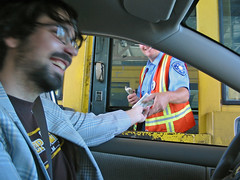Neven goes West
 Hey, I'm back. Back from my eight-day vacation in sunny, mild-weathered, beautiful California. I had been planning on going somewhere this summer, and it came down to a choice between New York, California, and New Orleans (which I still plan on visiting in the fall.) California was difficult to arrange with respect to practical issues, but it had the appeal of including a stay with the coolest person in the world, my friend Christa.
Hey, I'm back. Back from my eight-day vacation in sunny, mild-weathered, beautiful California. I had been planning on going somewhere this summer, and it came down to a choice between New York, California, and New Orleans (which I still plan on visiting in the fall.) California was difficult to arrange with respect to practical issues, but it had the appeal of including a stay with the coolest person in the world, my friend Christa. I left from Tampa early last Wednesday, changing planes in Memphis. A short 21st century rant: TPA offers free WiFi. MEM and SFO don't - you have to sign up either with PCS or FreedomLink. Boo! An interesting thing about MEM: there's a luggage store at the terminal called Baggage Claim. Isn't that a bit like calling a store Exit or Restrooms?
(In the following paragraphs, links lead to my pictures at Flickr. See the whole trip gallery here.)
I was greeted in San Francisco by Christa and her friend Jesse(sp?) who was flying out. Christa and I drove up to Napa Valley, where we spent the afternoon sightseeing. We stayed at the Shady Oaks Lane B&B - an excellent, cozy little place serving Champagne mimosas for breakfast, and dined at The Culinary Institute's Greystone Restaurant. Fantastic food, served in ridiculously small portions, perfectly fitting the rich, overwhelming flavors. The following day we toured the wineries, including Niebaum Coppola, Grgich Hills (a Croatian place!), Rombauer, Clos Pegase, and many others. Everybody was extremely friendly and not at all snobby - shame on me for expecting it.
We then drove up on Hwy 101 through awesome nature - listen to me, Mr. Gadget - arriving in Christa's town, Arcata. A very cute place - small and packed with interesting little shops and houses. It was a huge relief and joy for this disgruntled Floridian to be able to a) walk around town and b) not see a CVS and Wendy's on every (any!) corner. We visited a few nearby spots, like Lufenholtz beach, Fern Canyon, and the rest of Redwood National Park. It truly makes one feel more alive (or perhaps it was just the excellent company.)
We drove back to San Francisco on Tuesday, staying at The Phoenix Hotel, allegedly a rock'n'roll crowd favorite. I liked the city - it was busy and loud and trashy in places, and it took effort not to just stare around like the dumb tourist I was.
I came back yesterday and one of the first things I did was to check airplane fares for October. Ok, so it's a silly thing to do and I have no idea if I'll be able to afford another trip this year, but I really want to.



